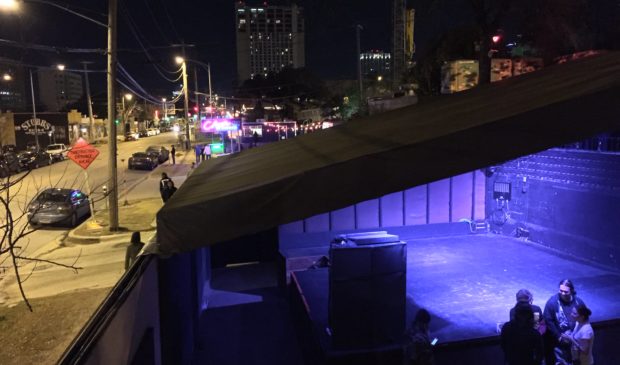Austin music venues seek $20 million from city to prevent closures
Thursday, July 23, 2020 by
Chad Swiatecki Austin’s Music Venue Alliance plans to ask the city to provide $20 million in aid specifically for music venues that have been closed since mid-March due to the Covid-19 pandemic.
The Music Venue Preservation Fund request was discussed at Wednesday’s Music Commission meeting, and is expected to be brought before City Council as a budget amendment in late August.
The proposal outlines $19 million in aid for venues’ fixed costs such as rent, utilities and payments to vendors, as well as $1 million to subsidize the cost of providing streaming concerts as a programming option. The $19 million is suggested to be divided into three tiers: $3 million for venues with capacity of 300 or less; $8 million for venues with capacities of 300-500; and $8 million for venues with capacity of 500 or more.
The proposal specifies that the money would likely have to come from the next round of federal funds provided under the Coronavirus Aid, Relief and Economic Security (CARES) Act. That aid package is expected to total around $1 trillion and is currently being negotiated by lawmakers in Washington, D.C.
In March, the venue alliance drafted a resolution for a proposed aid package totaling just over $5 million, which was expected to be carved out of the city’s $170 million from the first round of CARES Act funding. The framework for spending that money that was eventually passed by Council included a pool of just over $16 million for small business aid, but nothing specifically for music venues.
Rebecca Reynolds, head of the venue alliance, told the Music Commission that venues’ ongoing monthly costs have continued to mount and that they are likely to be the last small businesses to reopen.
“We’ve been told over and over again, and Council has unanimously approved three different times, that a venue disaster relief fund is necessary and appropriate and yet we still don’t have one,” she said. “We were told that the very first Council resolution earmarking money out of that $170 million would be a venue disaster relief fund. Now we’re on the back end of that $170 million and we’re being told that that money is all gone.”
A recent study from the University of Houston’s Hobby Center for Public Policy found that music venues are the small business category most vulnerable to permanent closure due to the impacts of the pandemic. The study found more than 60 percent of Austin’s music venues are likely to close by the fall without dedicated aid.
The Music Commission didn’t take any action on the proposal but will consider a possible resolution for support at an August meeting.
Reynolds said she is heartened by the news of a possible $10 billion federal aid package for music venues that was introduced Wednesday. That package was proposed and pushed by the National Independent Venue Association, the industry trade group that was co-founded by Stephen Sternschein, who is an owner of the Empire and Parish music venues.
“While we are encouraged by the fact that some lawmakers support specific dedicated music venue funding, we don’t want to let that distract us from what I’m here talking with you about today,” she said. “We’ve unanimously gotten our lawmakers here in town to agree on three occasions, and we still don’t have the funds. We want to continue to support the (Save Our Stages) effort in every way possible … while at the same time asking our city to follow through with the creation of a specific disaster relief fund here in town.”
In an emailed statement, Mayor Steve Adler told the Austin Monitor that specific aid for the city’s music venues will have to come from the state or federal level.
“I stand with Austin’s creative community and call on Congress to include music venue funds in the next relief package. We moved quickly to help and will continue to do all we can, but it’s not enough. Current needs are greater than the resources available. The only way to fully assist venues closed by this pandemic is with the help of our state and federal leaders.”
Photo made available through a Creative Commons license.
The Austin Monitor’s work is made possible by donations from the community. Though our reporting covers donors from time to time, we are careful to keep business and editorial efforts separate while maintaining transparency. A complete list of donors is available here, and our code of ethics is explained here.
You're a community leader
And we’re honored you look to us for serious, in-depth news. You know a strong community needs local and dedicated watchdog reporting. We’re here for you and that won’t change. Now will you take the powerful next step and support our nonprofit news organization?






